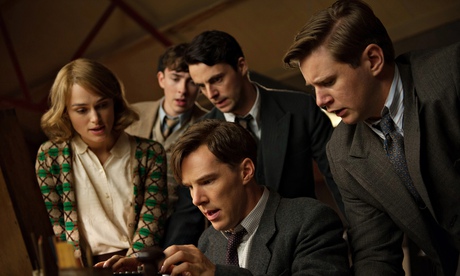
The story of Alan Turing, the Enigma codebreaker who helped win the second world war and was chemically castrated by the state for his troubles, is a challenging one to make into a movie.
Yes, there's some high-stakes stuff to work with: sex, spies, surveillance, the invention of computers and the fate of millions of people. But it's a tale whose key moments have already fallen victim to spoilers. Will Turing's massive deciphering machine work? It might. Will we beat the Germans? Possibly.
It's also a story whose hero is both venerated and pitied, but about whom most people know little.
Unlike, say, Stephen Hawking, whose biopic premiered at the Toronto film festival on Sunday, this is not a man whose work we got for Christmas, whose face and voice are immediately familiar. This allows Benedict Cumberbatch more free rein, but the audience less certainty over how to gauge his merits.
What Cumberbatch delivers is an impressively rounded character study of someone variously kind, prickly, aggressive, awkward and supremely confident. But it's almost too nuanced. Accuracy isn't all, but fumbling in the dark isn't always fun.
The film is bookended by scenes of Turing's interrogation by a Manchester policeman (Rory Kinnear) who smells a rat after investigating a burglary in Turing's flat. The place is a tip, yet nothing appears to have been taken, and the victim is sniffily dismissive: "What I could use now is not a bobby but a good cleaning lady."
Kinnear digs a little deeper and unearths … nothing. Turing has no war record. So what really went on at the radio factory where he said he worked?
And so the story proper starts, with Turing's interview at Bletchley Park, where he fares badly with the bluff sergeant Charles Dance, but is rescued by mysterious Mark Strong.
In an expository scene rich in Sorkin-ish dialogue and light on plausibility, we're told about the mission and introduced to the rest of the team, including Matthew Goode (cad), Allen Leech (Scot) and Matthew Beard as a little chap who always seems so ill-informed and off-the-pace you wonder if he's an intern.
New recruits are required if they're to whip Hitler, so Turing courts candidates through a cryptic crossword: if they solve it they can attend an exam in London. When Keira Knightley shows up and is mistaken for a secretary, you don't have to be a whiz to guess she'll not only ace the test but do so miles faster than her male counterparts.
Graham Moore's script tracks the code-cracking, alongside Turing and Knightley's burgeoning closeness and the progress of the war (through familiar newsreel). At points, we flash forward to the police investigation ("He's a poof, not a spy!" exclaims one copper, having a eureka moment) and back to Turing's schooldays friendship with a boy called Christopher.
Much about The Imitation Game – cast, subject matter, parquet flooring – appears to mimic the 2011 film of Tinker Tailor Soldier Spy, with which it also shares Working Title roots and a director making their English language debut (in that case, Tomas Alfredson, in this, Morten Tyldum). But it's not as chilly or convincing, doesn't burn with the same intellectual intensity as that film, nor of, say, The Social Network, whose template it apes.
What works is – as with Hawking story The Theory of Everything – the relationship between the central couple. Knightley is miles better than she's been in a while; sitting on a shelf rather than centre stage seems to suit her. She has fun with her plummy vowels, even when saying lines like "I'm a woman in a man's job". Cumberbatch's Turing is most interesting when at his softest; endlessly bashing up against less brilliant colleagues or military bureaucracy is bruising all round.
But it's the script which may prevent this hitting the Oscars jackpot. It's too formulaic, too efficient at simply whisking you through and making sure you've clocked the diversity message.: without square pegs – like those played by Cumberbatch and Knightley – the world would be by far the poorer.
"Sometimes it is the people no one imagines anything of that do the things no one can imagine," runs the movie's mouthful tagline. It leaves a strange taste. Turing's treatment was terrible. Perhaps his achievement, in the end, should not be tainted by association.
• Comments have been reopened to time with this film's Australian release

